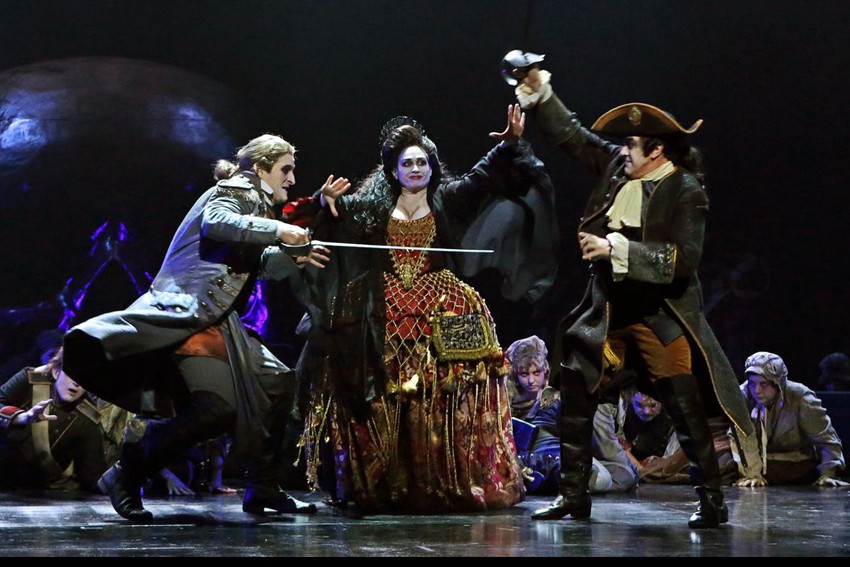Verdi and the Hand of Fate

Verdi may have been wrestling with his conscience when he wrote his darkest opera, La Forza del Destino (The Force of Destiny).
Verdi may have been wrestling with his conscience when he wrote his darkest opera, La Forza del Destino (The Force of Destiny). The avowed, outspoken freethinker was paying for his sins, said the Church fathers, when he lost his beloved first wife Margherita and their two children in quick succession. Then his second wife, the singer Guiseppina Strepponi, found out about a secret affair he was having with another soprano 20 years his junior, Teresa Stolz. That liaison in turn destroyed Verdi’s lifelong friendship with conductor Angelo Mariani, who had romantic claims on Stolzat the time. Embittered, Verdi was intent on breaking up their relationship until Mariani died 11 years later from cancer. “I am the one who has sinned and I am condemned to live.” These could have been Verdi’s own words – he typically took all the blame and wore ‘survivor guilt’. But instead they are the final utterances of Don Alvaro in Forza when, in the quiet of a monastery, he looks over his dying lover Leonora and her mortally wounded brother, Don Carlo, whom he has just fought in a duel. Out of despair he takes his own life. The messiest episode of Verdi’s life is thus re-enacted on stage with Alvaro, this ‘man of conscience’, serving as his alter ego. The message seems clear. Whether people are driven by love, loyalty, faith, jealousy or revenge, ultimately it makes no difference. Doom awaits us all. Forza certainly also seems to be one of the first openly irreligious operas. Verdi famously remark that religious people are “all mad”, and in the picture he paints, prayer and monastic seclusion are useless against the cruel, irrational hand of fate. So offended were Catholic sensibilities by this new opera that when it was staged in Milan in 1869, Verdi was forced to change the ending. Instead of killing himself, Alvaro falls to his knees and pleas for reconciliation with God. Adelaide is in for a rougher ride of Forza del Destino than is usual. In this bicentenary year of his birth we get to see the original, raw version premiered in St Petersburg in 1862. Netta Yashchin, assistant director for State Opera of SA’s production in October, explains: “Verdi lost his family – his wife and children. The church blamed him for his sins and got him to change the ending. But we decided to leave it as it was and stay with the St Petersburg ending. It says God doesn’t help anyone”. Yashchin is restaging for the Festival Theatre a new Opera Conference production by Tama Matheson that has already won much praise for its opulent staging and interpretative clarity. An enormous skull and death masks symbolise fate, while a towering statue of the Virgin and crucifix create strong Christian iconography. Most audacious is their decision to lift one of the opera’s minor characters, the Gypsy fortune-teller Preziosilla, into central prominence. Normally she makes just two fleeting appearances, but in this production she is omnipresent, forever bobbing around the characters, mocking them and casting knowing looks. “She is the force of destiny,” says Yashchin. “The force has a body and she is it. She shows that we can’t escape our destiny. We may think we are choosing things, but actually we are not.” This apparently insignificant fortuneteller links up the whole opera. In a complex, confusedly non-linear plot, “she explains everything that happens” says Yashchin. Preziosilla even changes the course of events. In the original story, as penned by the Spanish writer Ángel de Saavedra in his play Don Álvaro o la fuerza del sino, Alvaro throws his pistol down in submission to Leonora’s father, Marquis of Calatrava, but it accidentally fires and mortally wounds the Marquis. In this production, the fortune-teller fires it. “The pistol shot is actually from her. We can visually see it,” says Yashchin. “Call it fate.Verdi certainly did.” “Some things we can control,” she says. “Leonora forgot that her brother Carlo was out to kill her, not just Alvaro, after they ran off together. She runs to him when he’s injured, but he stabs her. Had she remembered, she might have been alright. How much we realise depends on our ability to reflect.” Do the characters deserve their miserable demise? Are they being punished for their misdeeds? No, thinks Yashchin. “Verdi thought they didn’t deserve their fate any more than his wife and children didn’t deserve to die. In the end, it is about Karma and human cruelty, which is around us in every society. Verdi is telling of how tragic this is. You can hear it in the music. There is so much reflection in his music, such deep melancholy running through it. It is almost Russian, like Dostoevsky – really emotional.” For this production, the much-admired Nicole Youl takes the role of Leonora, Rosario La Spina is Alvaro, and Michael Lewis is Carlo. Andrea Licata is conductor and Timothy Sexton chorus master. La Forza del Destino Festival Theatre October 12, 15, 17, 19 (7.30pm) saopera.sa.gov.au